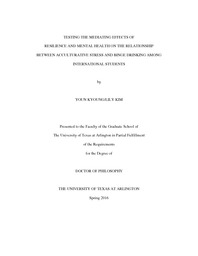| dc.description.abstract | The purpose of this study was to test the mediating effects of resilience and mental health (depression and anxiety) on the relationship between acculturative stress and binge drinking among international students in the United States. International students constitute approximately 4% of the total U.S. higher education population. Between 2014 and 2015, nearly 974,926 international students studied at U.S. colleges and universities. This rapidly increasing population faces multiple stressors such as cultural adjustment, academic pressure, financial concerns, language difficulties, and perceived discrimination. According to Hahn (2010), 22.6% of international students were clinically depressed, which is two times higher than domestic undergraduate students. Also, 36% of international students between the ages of 18 and 24 reported one or more incidents of binge drinking in a 2-week period (Koyama & Belli, 2011).
The cross-sectional design of this study tested the hypothetical model of binge drinking among a sample of international students. The multi-method approach for data collection used both: 1) a web-based online survey and 2) a paper-based face-to-face survey. The online survey used social networking sites such as Facebook and Twitter. The paper survey was conducted at four universities near the University of Texas at Arlington. A total sample of 322 was collected (131-online and 191-paper survey). The modified Index of Life Stress (Yang & Clum, 1995; 15 items, α=0.86), the Resilience Scale for Adults (Friborg, Hjemdal, Rosenvinge, & Martinussen, 2003; 20 items, α=0.94), and the Patient Health Questionnaire-SAD: PHQ-9 and GAD- 7 (Spitzer et al., 1994: α=0.91 and α=0.92 respectively) were used to measure the four latent variables: 1) acculturative stress, 2) resilience, 3) depression, and 4) anxiety. Binge drinking was measured with a single item question on a 6 point Likert scale, “Think back over the last two weeks, how many times have you had five or more drinks in a row?” To handle missing values, the study used multiple imputation. The main analysis conducted a Structural Equation Modeling (SEM), using Mplus version 7 to test the measurement and structural models.
The results from the measurement model showed good model fit (χ²=145.83, df=57, χ²/df=2.56, CFI=0.95, TLI=0.93, SRMR=0.048, RMSEA=0.07). Also, the results from the structural model showed that the direct effect of acculturative stress on resilience, the direct effect of resilience on binge drinking, and the direct effect of acculturative stress on mental health were significant. The indirect effect of acculturative stress on binge drinking through resilience was significant. Resilience mediated the relationship between acculturative stress and binge drinking in the conceptual model. However, the results did not support the main hypothesis (the mediating indirect effects of resilience and mental health on the relationship between acculturative stress and binge drinking).
The findings have larger implications for the overall academic environment by providing insight into international student needs. The awareness of resilience may help schools and health care providers adopt more effective strategies to overcome behavioral health problems (i.e., depression, anxiety, and binge drinking) caused by acculturative stress among international students. More importantly, the results of this study may also be useful in informing U.S. colleges and universities as they make decisions about programs and services for international students and may thus benefit other international students. Furthermore, the hypothesized conceptual model of binge drinking can assist in the creation of replicable models of resilience that can be applied to other vulnerable populations adding to the translational science literature. | |


